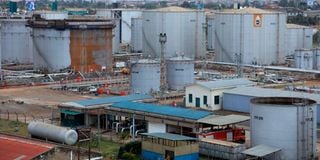Premium
KPC’s pipeline tariffs dilemma intensifies on budget pressures

Kenya Pipeline Company’s petroleum storage facility in Industrial Area, Nairobi in this photo taken on January 22, 2021.
In two successive financial years between 2019 and 2021, the State-owned Kenya Pipeline Company (KPC) suffered back-to-back blows from service traffic cuts that cost it billions of shillings in revenue.
In 2019, the Energy Petroleum Regulatory Authority (Epra) cut tariffs for use of Kenya’s pipeline by between 19percent and 3 per cent for local sales and 48 per cent and 33 per cent for export sales respectively -- sending KPC’s revenues tumbling to Sh26.1 billion for the fiscal year ended June 2020, from Sh31.5billion the previous year.
In the changes, Epra set the rate at Sh3,692.45 ($30.89) per 1,000 litres of transit fuel from the Sh7,172.05 ($60) for the same volume in the new tariffs that were aimed at winning back fuel exporters to neighbouring countries. KPC had proposed tariffs at Sh4,635 per 1,000 litres for the export market
The rates fell further to Sh3,663.71($30.65) in 2020 and later to Sh3,474.85($29.07) last year even as KPC unsuccessfully lobbied Parliament to intervene to curb further chops on its revenue amid upcoming capital-intensive expansion projects.
EPRA later reviewed and amended the tariffs effective February 15, 2020—handing the corporation some relief.
But that wasn’t all for KPC. In September 2021, the firm was dealt a further financial blow after the energy regulator cut the cost of storing and handling imported fuel by 31 percent amid sustained efforts to keep pump prices low and stem public anger.
VTTI-Kenya terminal
The reduced tariffs are applicable at the State-run Kipevu Oil Storage Facility (KOSF), Kipevu Oil Terminal (KOT) as well as the privately-owned VTTI-Kenya terminal in Mombasa.
The changes meant that effective August 1,2021 dealers pay $3.59 (Sh429.12) per cubic metre as a combined handling and storage fee for imported fuel, down from $5.18 (Sh619.17).
In the new tariff schedule, marketers are now paying a fuel handling levy of $0.28 (Sh 33.46) per cubic metre, down from $0.99 (Sh118.34) while the storage charges dropped to $3.31 (Sh395.68) from $4.19 (Sh500.86).
The handling and storage fees however rose to $3.93 (Sh469.90) per cubic metre from July this year and further to $4.18 (Sh499.84) from July 2023.
Although the Epra reviews favoured oil marketers and consumers, they dealt a major financial blow to KPC, which draws revenues from the KOSF.
The KPC raised Sh3.58 billion in storage fees from its Kipevu storage facility popularly known as KOSF in the period to June 2020. Going by the revenue performance figures in the year to June 2020, it means that KPC would have lost 31 percent of the earnings or close to Sh1.1billion.
Earnings from storage and handling fees accounted for 13 per cent of KPC’s overall revenue for the financial year ended June 2020.
Spooked by the impact of the back-to-back tariff cuts, the KPC is back in the fray seeking an upward review of the charges after an unsuccessful bid in 2019.
Epra on Thursday said KPC has applied for a review of the transportation and storage tariffs for the period 2021/22 to 2024/25.
Epra said KPC aims to use revenue from the proposed tariff – initially submitted in January and amended last month – to partly fund the enhancement of the firm’s pipeline between Mombasa and Nairobi.
“In January 2022, Epra received an application from KPC for the review of the pipeline transportation and secondary storage tariffs of the period 2021/22 to 2024/25,” said Epra Director-General Daniel Kiptoo in a notice.
“KPC further submitted an amended tariff application dated July 18, 2022 taking into consideration capital expenditure provision for capacity enhancement of the eastern (Mombasa-Nairobi) section of the pipeline and the proposed revised throughput forecast,” he said.
KPC contracted Lebanese firm Zakhem International Construction for the multi-phased construction of the 450-kilometre oil pipeline at Sh48 billion in July 2014.
In the new application, KPC seeks to raise the storage and handling tariff to Sh874.44 per cubic meter of petroleum starting in the current 2022/23 fiscal year, up from Sh696.83 currently before raising it further to Sh998.20 in 2024/25. It also seeks to adjust the transportation tariff to Sh3.87 per cubic meter of fuel per kilometre in the 2022/23 financial year from Sh3.56 currently. This would rise to Sh4.05 in 2024/25.
Composite tariff
KPC further seeks to adjust the composite tariff to Sh5.22 percubic meter per kilometre from Sh4.61 presently. This tariff would be raised to Sh5.6 by 2024/25.
The storage and distribution costs remain the smallest components of fuel costs charged at Sh3.62 per litre of petrol, Sh3.23 for diesel, and Sh3.22 for kerosene in the August-September pricing cycle.
They cater for the cost KPC incurs for pumping the fuel through its pipeline, pipeline losses, the costs of evacuating the fuel from the pipeline to road tankers, depot losses, and the costs of delivering the fuel to petrol stations that are within 40 kilometres of Nairobi.
KPC has had two tariff adjustments since 1994. The first review was in 2009 when the tariff was increased by 47 per cent from Sh 3.4/m3/km through a phased adjustment to Sh 4.5/m3/km effective April 2009 and Sh 5/m3/km effective April 2010.
The second adjustment was in 2016 when a 4.4 per cent increase to Sh 5.22/m3/km was approved by ERC on April 19, 2016, and effected in June 2016. All tariffs were adjusted by 4.4 per cent.
A fresh increase in tariffs by KPC could however raise the burden of high fuel costs on consumers at a time the government has announced plans to withdraw the fuel subsidy.






